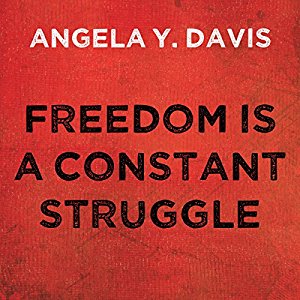Review: Freedom is a Constant Struggle
Angela Davis is one of the most significant thinkers of our time, and her book, Freedom is a Constant Struggle, offers a thorough analysis of and paths forward for the movements of today. This unique collection of interviews, essays and speeches highlights the struggles against international violations of human rights and our crises here in the United States. Specifically, Davis
March 16, 2018, 3:31 pm
By The Collective
Angela Davis is one of the most significant thinkers of our time, and her book, Freedom is a Constant Struggle, offers a thorough analysis of and paths forward for the movements of today.
This unique collection of interviews, essays and speeches highlights the struggles against international violations of human rights and our crises here in the United States. Specifically, Davis connects the oppression of the people of Palestine to the oppression of African Americans in the United States. Davis suggests that those who want to abolish systemic racism here in the United States must look beyond our borders to the struggles of others. “Just as we say ‘never again’ with respect to the fascism that produced the Holocaust, we should also say ‘never again’ with respect to apartheid in South Africa, and in the southern US. That means, first and foremost, that we will have to expand and deepen our solidarity with Palestine,” Davis explains.
Her worldly view, her insistence that the oppressed must be liberated, that the fight is happening in Palestine, in South Africa and in South Carolina, is refreshing, and is a reminder that in order to truly enact change, we have to adopt a broader view and a global sense of solidarity.
Davis also analyzes the importance of prison abolition and black feminism and specific issues such as police brutality and the militarization of police. Her experience and knowledge shine as she masterfully weaves the intersections of race, gender and socioeconomic status together in a ways that readers can digest and add to their mental library of reasons to resist.
The format of the book allows the reader to easily connect to Davis in it’s stream-of-thought style, and this makes her words all the more inspiring and moving. Davis knows intrinsically that the path to liberation and freedom is not easy, nor is it short; but she convinces readers that it is a worthy path.






